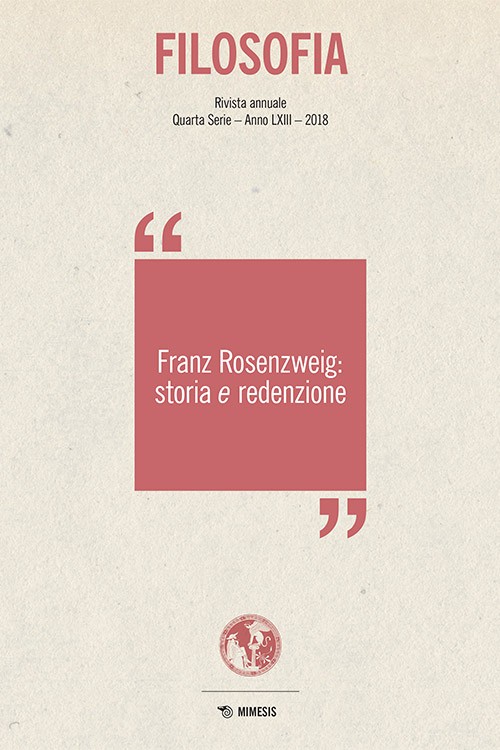Aesthetics and Politics: Reflections on Love and the Origins of Fascism
DOI:
https://doi.org/10.13135/2704-8195/3797Abstract
Arguing against the grain of conventional readings that Rosenzweig’s philosophy is a-historical, I maintain instead that a more nuanced and faithful reading should take into account the underlying logical dynamics of his speech-act philosophy that become embodied through the role that love relationships – understood aesthetically on both individual and communal levels – are ways to ‘redeem’ history messianically, thereby redeeming or creating more just political communities. This happens at the level of an immanent, normative critique of the dominant authoritarian pressures to assimilate to existing social and political conditions. I connect that with a reading of Benjamin’s philosophy, arguing that Rosenzweig’s “messianic aesthetics” determinatively influenced Walter Benjamin’s dialectics of ethical and political critique – which resulted in Benjamin’s work becoming both revelatory and historically redemptive, that is, politically messianic.
Downloads
Riferimenti bibliografici
W. Benjamin, The Arcades Project (1982), Engl. transl. by H. Eiland and K. McLaughlin, prepared on the basis of the German volume ed. by R. Tiedemann, Cambridge-London, The Belknap Press of Harvard University Press, 2002.
W. Benjamin, The Work of Art in the Age of Its Technological Reproducibility (1936), Engl. transl. by E. Jephcott and H. Zohn, in Idem, Selected Writings, vol. 3, 1935-1938, ed. by H. Eiland and M. W. Jennings, Cambridge-London, The Belknap Press of Harvard University Press, 2002, pp. 101-133.
W. Benjamin, One-Way Street (1928), Engl. transl. by E. Jephcott, ed. by M. W. Jennings, preface by G. Marcus, Cambridge-London, The Belknap Press of Harvard University Press, 2016.
M. Kavka, Jewish Messianism and the History of Philosophy, Cambridge, Cambridge University Press, 2004.
E. Levinas, Totality and Infinity. An Essay on Exteriority (1969), Engl. transl. by A. Lingis, Dordrecht-Boston, Kluwer, 1991.
S. Mosès, The Angel of History. Rosenzweig, Benjamin, Scholem (1992), Engl. transl. by B. Harshav, Stanford, Stanford University Press, 2009.
F. Rosenzweig, Hegel und der Staat, 2 vols., München-Berlin, R. Oldenbourg, 1920.
F. Rosenzweig, Der Stern der Erlösung (1921), in Idem, Der Mensch und sein Werk. Gesammelte Schriften II, introduction by R. Mayer, Haag, Martinus Nijhoff, 1976; Engl. transl. by W. W. Hallo, The Star of Redemption, Notre Dame, Notre Dame Press, 1985.
F. Rosenzweig, Jehuda Halevi. Zwei-undneunzig Hymnen und Gedichte, Berlin, Lambert Schneider, 1927; Engl. transl. by T. Kovach, E. Jospe, and G. G. Schmidt, Ninety-Two Poems and Hymns of Yehudah Halevi, ed. by R. A. Cohen, Albany, State University of New York Press, 2000.
J. Simon, Benjamin’s Feast of Booths, in “Philosophy Today”, XLVII (2003), no. 3, pp. 258-265.
J. Simon, Rosenzweig’s Messianic Aesthetics, in Franz Rosenzweigs “neues Denken”. Internationaler Kongreß Kassel 2004, ed. by W. Schmied-Kowarzik, 2 vols., Freiburg-München, Karl Alber, 2006, vol. 1, pp. 407-417.
J. Simon, Benjamin in Paris: Weak Messianism and Memories of the Oppressed, in Topographien der Erinnerung. Zu Walter Benjamins Passagen, ed. by B. Witte, Würzburg, Königshausen & Neumann, 2008, pp. 91-100.
J. Simon, Art and Responsibility. A Phenomenology of the Diverging Paths of Rosenzweig and Heidegger, New York-London, Continuum, 2011.
R. Wolin, Walter Benjamin. An Aesthetic of Redemption, Berkeley-Los Angeles-London, University of California Press, 1994.
##submission.downloads##
Pubblicato
Come citare
Fascicolo
Sezione
Licenza
Filosofia applica una licenza Creative Commons Attribution 4.0 International License a tutto il materiale pubblicato.



